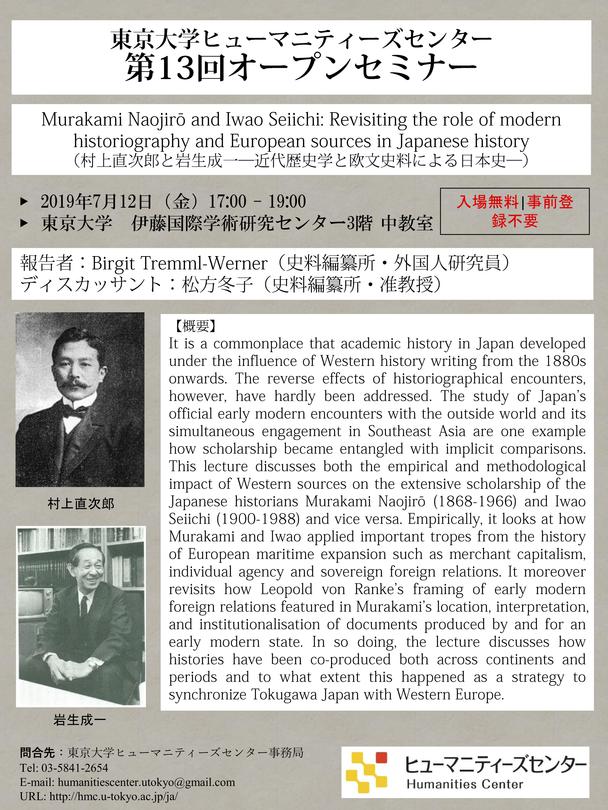Murakami Naojirō and Iwao Seiichi: Revisiting the role of modern historiography and European sources in Japanese history (村上直次郎と岩生成一─近代歴史学と欧文史料による日本史─)

- 日時:2019年7月12日(金)17:00 - 19:00
- 場所:東京大学 伊藤国際学術研究センター3階 中教室
- 報告者:Birgit Tremml-Werner(史料編纂所・外国人研究員)
- コーディネーター&ディスカッサント:松方冬子(史料編纂所・准教授)
概要:
It is a commonplace that academic history in Japan developed under the influence of Western history writing from the 1880s onwards. The reverse effects of historiographical encounters, however, have hardly been addressed. The study of Japan's official early modern encounters with the outside world and its simultaneous engagement in Southeast Asia are one example how scholarship became entangled with implicit comparisons. This lecture discusses both the empirical and methodological impact of Western sources on the extensive scholarship of the Japanese historians Murakami Naojirō (1868-1966) and Iwao Seiichi (1900-1988) and vice versa. Empirically, it looks at how Murakami and Iwao applied important tropes from the history of European maritime expansion such as merchant capitalism, individual agency and sovereign foreign relations. It moreover revisits how Leopold von Ranke's framing of early modern foreign relations featured in Murakami's location, interpretation, and institutionalisation of documents produced by and for an early modern state. In so doing, the lecture discusses how histories have been co-produced both across continents and periods and to what extent this happened as a strategy to synchronize Tokugawa Japan with Western Europe.
日本の歴史学は、1880年代以降、西洋の歴史学・歴史叙述の影響のもとに発展してきたというのが一般的な理解である。しかしながら、歴史叙述における反対方向の作用は、ほとんど省みられてこなかった。学問は、同時代の社会的な状況と潜在的な関係を持つものであるが、日本近世対外関係史(外交史)研究と1890年代以降の日本の南進は、その例となる。
本報告では、ヨーロッパ言語史料を用いることが、日本人歴史家、村上直次郎(1868~1966年)と岩生成一(1900~1988年)の幅広い学識に与えた影響と、彼らの学識がヨーロッパ言語史料の読解に与えた影響を、個別実証的ならびに方法理論的な見地から論じる。
個別実証的には、村上と岩生が、ヨーロッパ海外発展史から借用した重要な修辞、たとえば商業資本主義、個人の主体性、主権などについて検討する。さらに、レオポルド・フォン・ランケ流の16~17世紀対外関係の枠組みが、近世国家によって、あるいは近世国家のために作成された史料の、村上による位置づけ、解釈、組み立てにどのような特徴を与えたかについても、再検討を加える。それによって、歴史学が、大陸と時代を超えて、双方向的に作り上げられてきたのか、そしてどの程度、この動きが徳川日本を西ヨーロッパの同時代的発展を描こうとする戦略として行われたのかを議論したい。


